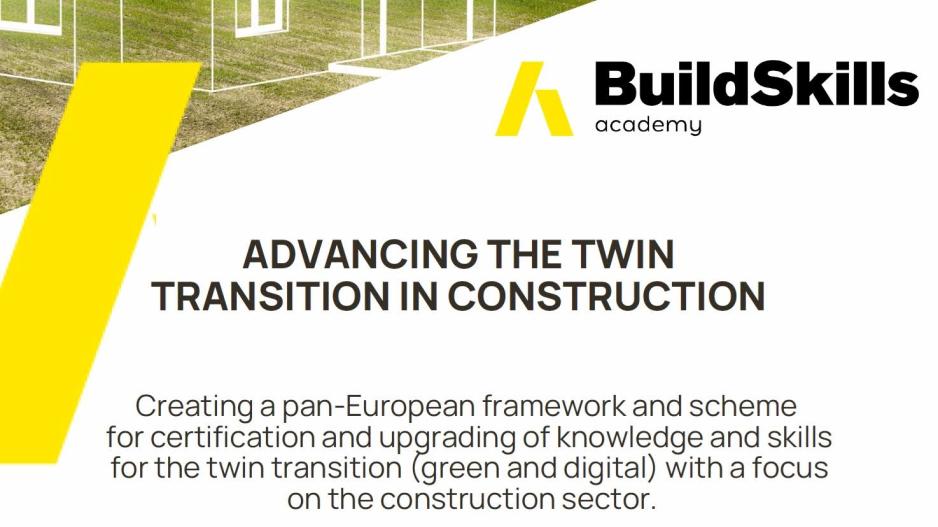Roundtable Discussions Across Europe: Building Skills for a Greener, Digital Future
Defining and Integrating Essential Skills for the Construction Sector.
The BuildSkills Academy project, funded under the Erasmus+ programme, is making significant strides in transforming vocational education and training (VET) for the construction sector. This initiative aims to equip the sector with the essential skills needed to navigate the green and digital transformations in Europe.
An essential element of the project is the Build Enriched Skills Methodology (BESM) developed to guide VET providers in enhancing their courses. The BESM methodology follows a structured three-step process: Self-Assessment, which evaluates the current course content; Gap Identification, which generates a report to highlight missing skills; and Enrichment, which provides guidelines and best practices for updating course content, teaching methods, and assessments.
To further this goal, Roundtable Discussions were held across six countries: Bulgaria (29 October), Cyprus (29 October), Lithuania (7 November), Italy (8 November), Bosnia and Herzegovina (11 November), and Greece (11-15 November). These discussions provided an opportunity for VET providers, industry representatives, and sector experts to assess the relevance of BESM in meeting market demands for sustainability and digitalization skills. The insights from these discussions have been instrumental in refining the methodology, ensuring it aligns with national VET policies and fosters cooperation between education providers and industry stakeholders.
At the heart of the BuildSkills Academy project lies the ambition to define and integrate essential skills for the future of the construction sector. Through the development of a robust certification framework, updating VET curricula, and piloting innovative training programs, the project seeks to bridge certification gaps across EU member states while enhancing vocational training’s role in shaping the sector’s progress. The Roundtable Discussions were an essential component of this effort, providing valuable insights that will guide the refinement of the BESM methodology and ensure its continued relevance.
The roundtable discussions highlighted both shared challenges and unique circumstances regarding workforce development in the construction sector, particularly in relation to green and digital skills. A common thread throughout all discussions was the need to update curricula and training programs to reflect the evolving demands of the sector. There was a widespread recognition of the need to integrate modern technologies, green competencies, and digital tools into VET offerings.
In Bulgaria, the key challenges revolved around a lack of practical training, green and digital skills, and a disconnect between education and industry needs. Stakeholders emphasized the need to update curricula, develop VET centers, and foster partnerships between businesses, educators, and policymakers to address the aging workforce and low motivation among young professionals.
Cyprus focused on the adaptability of the BESM to local needs. Stakeholders highlighted the importance of integrating existing certification schemes, ensuring sustainability through local partnerships and funding, and regularly updating the methodology to reflect legislative changes and evolving industry needs. The need for clearer stakeholder engagement and quantifiable self-assessment tools was also emphasized.

In Lithuania, the BESM methodology was found to align well with EU policies, particularly regarding green and digital skills. The discussions emphasized addressing skill gaps in digital tools and sustainable construction practices while ensuring that training programs remain relevant to industry demands. Lithuania also explored the methodology’s potential for application beyond construction, in sectors like manufacturing, healthcare, and IT, and recommended enhancing platform accessibility and gathering user feedback.
Italy saw BESM as highly relevant for supporting the green and digital transitions but noted the challenges of an aging workforce and fragmented industrial structures. The discussions focused on aligning BESM with EU policies on lifelong learning and sustainability, and participants expressed interest in testing the methodology in sectors beyond construction, such as healthcare and manufacturing. The importance of “train-the-trainer” programs and improving VET’s attractiveness was also emphasized.
Bosnia and Herzegovina highlighted the need for stronger national-level frameworks to support VET initiatives. While the BESM methodology was deemed relevant, its application was limited by the lack of a robust adult education system and national frameworks for qualifications in professions like architecture and civil engineering. The focus was on addressing industry needs through clearer metrics and better collaboration with industry representatives.
Finally, Greece acknowledged the importance of green and digital competencies but also pointed out the need to address broader skill gaps within the sector. Greece faced challenges with a significant proportion of foreign workers, underscoring the need for language support and lower-level skills training. Recommendations included broadening the methodology to cover additional competencies and regularly updating the skills matrix to ensure its relevance across different sectors.
Across all countries, a consistent theme emerged: the need to update curricula and training programs to reflect the evolving demands of the construction sector, particularly in green and digital skills. There was broad agreement on the importance of fostering collaboration between stakeholders to ensure that VET initiatives align with the dynamic needs of the industry. Stakeholders recognized the need to bridge the disconnect between education and industry, address skill gaps, and make VET pathways more attractive, particularly to younger generations. Many also explored the potential for applying the BESM methodology in other sectors, such as healthcare, IT, and manufacturing, emphasizing the need for broader adaptability and continuous updates to training programs and qualifications.
The insights gathered during these discussions will play a crucial role in refining the BuildEnrichedSkills methodology, ensuring it meets the evolving needs of the construction sector while promoting cooperation between education providers, industry stakeholders, and policymakers. Through these efforts, the BuildSkills Academy project is paving the way for a greener, more innovative Europe, equipped with the skills necessary to thrive in an increasingly digital and sustainable world.
The project Academy for Transitional Skills in the Built Environment is co-funded by the European Union, ERASMUS+ Programme under Grant Agreement number: 101104419.
More information about the project:
https://www.linkedin.com/company/buildskills-academy/
https://www.facebook.com/BuildSkillsAcademy
https://buildskillsacademy.com
https://www.linkedin.com/company/buildskills-academy/posts/?feedView=all






